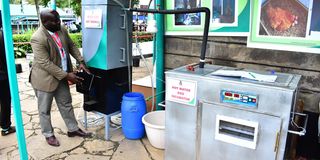Egerton University builds hot shower powered by maize cobs

Dr. Joseph Alele from the Department of Agricultural Engineering at Egerton University explains automatic hot water egg incubator works on July 5,2025.
As electricity prices continue to rise, small-scale farmers in Kenya are feeling the strain, especially those who rely on power to run essential equipment like egg incubators.
However, an innovation from Egerton University is offering a cheaper, greener alternative, using maize waste to heat water and power farm operations.
With just one bucket of dry maize cobs, farmers can now generate enough hot water for their homes and run an incubator that hatches up to 240 eggs, without relying on electricity.
“We came up with the idea of a maize cob-powered hot shower and a hot water egg incubator to support small-scale farmers, especially those who grow maize and keep poultry,” says Dr. Joseph Alele from the Department of Agricultural Engineering at Egerton University.
“Many of them face challenges due to the high cost of electricity, particularly when it comes to heating water and incubating eggs.”
The dual-purpose system can use any type of burnable biomass and requires only 5kg of maize cobs to heat 50 litres of water, enough to serve a household of three to four people for an entire day.
Dr. Alele explains that on average, such a household would use about 3 kilowatts (kWh) of electricity daily for hot water. With electricity costing roughly Sh. 100 per kWh, that's about Sh. 300 per day just for heating water.
By switching to this biomass-powered system, a household can save that entire amount each day. Over 21 days, this adds up to Sh. 6,300 in savings, money that would otherwise go to electricity bills.
“At the beginning of last year, Sh. 1,000 could buy you about 39 kWh. Now, the same amount only gets you 34,” Dr. Alele notes. “That means you’re paying more for less, which makes alternatives like this biomass system even more valuable for cost-conscious farmers.”
The hot water generated is stored in an insulated boiler that retains heat for hours with minimal energy loss. The water circulates through pipes and is reused, so nothing is wasted.
The system also includes automatic sensors for temperature, humidity, and egg turning at 45 degrees every three hours.
Once the water reaches 38°C, a valve shuts off to prevent overheating. When the temperature drops below 37.5°C, the system restarts, maintaining optimal conditions for household use and incubation.
“If you're not interested in incubation, which costs about Sh. 100,000, you can still buy the boiler alone for household needs like showering, which costs around Sh. 50,000,” adds Dr. Alele.
“While the upfront cost may seem high, it’s a worthwhile investment. You can hatch 264 chicks every 21 days. If each chick sells at Sh. 100, that’s Sh. 26,000 every three weeks. Over a year, it adds up and becomes a profitable business.”
The technology has been developed by students from Egerton’s Department of Agricultural Engineering and Technology, an innovation designed to tackle both energy poverty and food production challenges.

